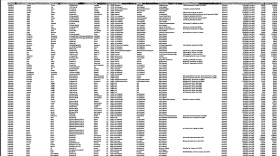Bernie Sanders may be running an unconventional campaign for the Democratic presidential nomination. But to close the sale with New Hampshire voters, he has put his money on a rather conventional means: television advertising.
Sanders, whose lead over Hillary Clinton has reached double digits in recent polls, has reserved $1.2 million in broadcast ads over the final two weeks of the primary. Right now, that’s more than twice the amount Clinton’s campaign has committed for the final push. (Martin O’Malley, the third Democrat in the race, has yet to run any television ads in New Hampshire.)
Sanders gave Clinton a three-month head start on television, waiting until November to run his first campaign commercial. But since then, the Vermont senator has outspent Clinton on the air in New Hampshire by $2.4 million. The more than 1,100 spots scheduled to run from Jan. 26 through Feb. 9 by the Vermont senator represent nearly 1 in 4 of the primary-related ads – for both Democrats and Republicans - reserved for the next two weeks.
At this stage, Clinton’s much smaller ad buy doesn’t mean she’s conceding the New Hampshire primary to Sanders, says UNH political science professor Dante Scala. But a loss in the Granite State, which Clinton won in 2008, would be easier for her campaign to accept than a second-place finish in next week’s caucus in Iowa, where the race with Sanders is much tighter.
“An Iowa loss would change the conventional wisdom significantly,” Scala says. “Not that they aren’t trying in New Hampshire, but I think they clearly see Iowa as the top priority.”

On the Republican side, Jeb Bush and Marco Rubio will continue to dominate the airwaves through Primary Day. The two candidates, who are far behind Donald Trump in the polls, will combine to air nearly 2,000 ads in the final two weeks. Most of those ads will have a positive spin.
Meanwhile, the super PACs supporting Bush and Rubio have so far reserved another 900 ad spots, at a cost of $4.2 million. According to data compiled by the Political TV Ad Archive, those ads are much more likely to be negative.
Perhaps the biggest surprise going into the final stretch, Scala says, is lackluster spending to support John Kasich, a Republican who has placed as high as second place in New Hampshire in recent polls.
While his campaign has spent minimally on television in here, two super PACs supporting the Ohio governor, New Day for America and New Day Independent Media Committee, have poured more than $8 million into the local broadcast market since last summer.
Yet, right now, Kasich has booked no ads for the final two weeks, and New Day for America has plans to spend just $34,000 for 11 spots to run on Boston’s WCVB.
Scala says that, unlike Bush and Rubio, who have the resources and will to weather loses in the early states, Kasich has much more to lose by a poor showing in New Hampshire.
“It’s very clear that Kasich lives or dies by his New Hampshire performance,” he says. “I’d be surprised if they wouldn’t have enough to have a healthy presence for this week and next.”
One candidate who has signaled that he doesn’t need the New Hampshire Primary -- or at least not as much as some of his rivals -- is Ted Cruz.
The Texas senator has barely campaigned in the Granite State, and he’s spent the bulk of his media budget in Iowa and South Carolina, which holds its primary Feb. 20. Cruz didn’t run an ad in New Hampshire until earlier this month, and he’s on course to spend less than $100,000 on local television the final two weeks.
Cruz’s strategy might come as a relief to New Hampshire television viewers. Right now, candidates and their surrogates are on track to spend at least $70 million on commercials targeting primary voters.
That includes more than $10 million in the final two weeks, a figure that will almost certainly grow as candidates and outside groups adjust their strategies after the Iowa caucuses.
For Clinton, a loss in Iowa could trigger a barrage of ads in New Hampshire aimed at drawing support away from Sanders.
Among the Republicans, no matter where Bush and Rubio finish in Iowa, their super PAC supporters aren’t likely to back off now. They continue to invest in attacking each other, and may very well feel compelled to target Cruz as well.
And a last-minute ad surge by Kasich isn’t out of the question either.
On Wednesday, he sent out a fundraising email, asking for help to counter a half-million dollars in negative ads purchased in New Hampshire by American Future Fund, a conservative non-profit based in Iowa.







